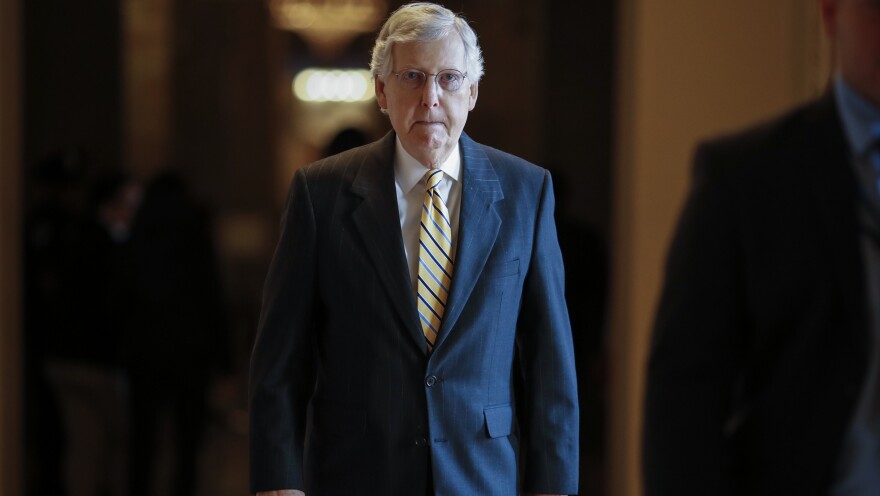Democrats have been trying to pressure Mitch McConnell to take up election security measures that passed out of the House of Representatives earlier this year, but the Senate majority leader has shown little willingness to do so.
In his home state of Kentucky, McConnell has been dogged by protesters calling him "Moscow Mitch" — one of the few epithets he dislikes. A billboard in his hometown of Louisville now urges his constituents to "Tell Mitch McConnell: Stop Blocking Election Security Funding."
That billboard is part of a $100,000 ad campaign from progressive group Stand Up America, which is urging McConnell and vulnerable Republican senators to pass a bill that includes $600 million for states to replace electronic-only voting machines and with ones that use paper ballots.
McConnell might face the most pressure on election security from his Republican colleagues in the Senate, some of whom are facing tough reelections.
The billboard also targets Republican Sens. Joni Ernst of Iowa, Susan Collins of Maine, Cory Gardner of Colorado, Martha McSally of Arizona, Thom Tillis of North Carolina and David Perdue of Georgia.
But the pressure is unlikely to mount in his home state, which is largely rural, increasingly Republican and very supportive of President Trump.
In the eastern Kentucky mountain city of Pikeville, retired coal miner and railroad worker John Deskins says that election security is important but that Democrats are the ones who have mishandled the issue.
"What little bit I understand about it is they put other implements in it to try to alter exactly what's necessary," Deskins said.
The bill blocked by McConnell would have required all ballots for federal elections to be backed up electronically, given states $600 million to improve their election infrastructure, and required that electronic voting machines be manufactured in the United States, among other things.
DeRonda Smith, a retired teacher from Hazard, says she also thinks election security is important, but McConnell's handling of the issue won't change her support for him.
"I don't think it's really a driving issue. I just think it's a very big safety concern," Smith said.
McConnell was first elected to the Senate in 1984 and will try to win his seventh term in office next year.
Over the course of his tenure, Kentucky has turned from a solidly Democratic-voting state to a Republican one.
And local Republican voters say the change came because they no longer related to Democrats at the federal level.
Pikeville resident Jim Hamilton says he was a Democrat for 47 years.
"When Trump decided to run, I wasn't a Democrat anymore. I'm a Republican," Hamilton said.
"I couldn't stand anymore this Obama thing," he said. "Obama came here to eastern Kentucky; he shut our coal mines down."
But Democrats in Kentucky and across the country still hope they can persuade McConnell to take up the election security measures — partly by echoing the new insult he hates so much.

Christina Trosper is a local Democrat who showed up to a hot August political event with a Russian-styled fur hat with a button that says "Say Nyet To Moscow Mitch."
"My hat is an ode to Mitch McConnell and his apparent love for all things Russia," Trosper said.
As a lifelong Kentuckian, I think it's time.
"As a lifelong Kentuckian, I think it's time — we gave him his chance, he got in power, he got into his leadership position and he's turned his back on the hardworking people in this state."
McConnell normally embraces insulting monikers like "the Grim Reaper," "Darth Vader" or "Cocaine Mitch." (His campaign sold "Cocaine Mitch" T-shirts after West Virginia U.S. Senate hopeful Don Blankenship tagged him with the nickname last year. Blankenship lost in the Republican primary election.)
But McConnell says that "Moscow Mitch" is a step too far. Back in July, he took to the Senate floor to denounce people accusing him of cozying up to Russia, calling it "modern-day McCarthyism."
"No matter how much they lie, no matter how much they bully, I will not be intimidated," McConnell said.
McConnell was tagged with the nickname in July after he refused to take up two election security bills that passed out of the Democrat-led House of Representatives.
He maintains that the country has done enough to deal with election security following Russian meddling of the 2016 U.S. elections.
"There won't be votes on things that are unrelated to having a successful election in 2020. Don't buy the spin," McConnell said in a brief press conference.
Copyright 2021 Louisville Public Media. To see more, visit Louisville Public Media. 9(MDA1NTMzNDA4MDEyNzk4MTU2OTg2ZjAyZQ004))



